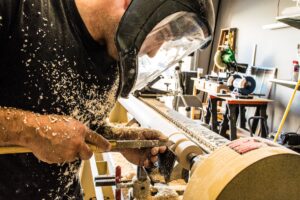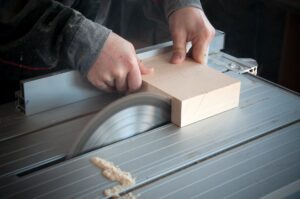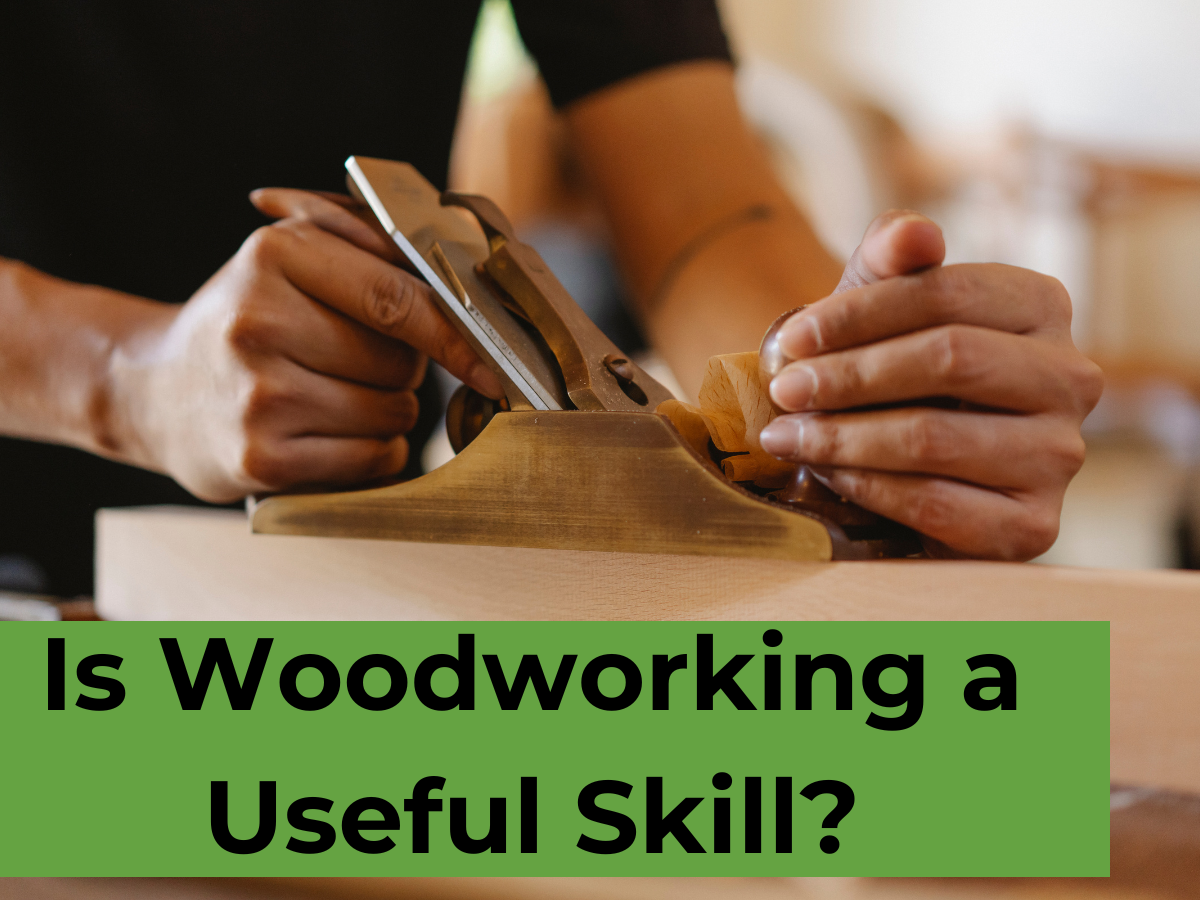Hey, I am James Brown, and welcome to my new article, where I will tell you is Woodworking is Usefull Skill or not?
Considering taking up woodworking? You’re on the right track! Woodworking is not only a productive hobby but also an incredibly useful skill that can translate into practical life improvements and even become a lucrative career. Here’s why honing your ability to work with wood is such a valuable pursuit.
What is Woodworking?

Woodworking is the craft of creating items from wood, encompassing a broad range of skills from carving and joinery to cabinet making and carpentry. It’s an ancient art that has evolved significantly with technology, yet the satisfaction of creating something by hand remains unchanged.
Benefits of Learning Woodworking
- Develops Practical Skills – Woodworking teaches you how to use various tools and techniques that can be applied to everyday tasks and projects around the home. From operating power tools to joinery methods, it provides practical abilities.
- Fosters Creativity – With woodworking, you are only limited by your imagination. There is plenty of room for creativity in designing and making anything from furniture to decorative objects. It’s a great outlet for creative expression.
- Relieves Stress – The process of working with your hands to transform raw wood into something useful or beautiful has proven mental health benefits. It can lower stress levels and provide a sense of accomplishment.
- Can Save Money – Being able to make and repair household items yourself rather than buying new saves money. Even if you need to buy supplies, homemade still often costs less than purchasing finished products.
- Opportunity for Bonding – Woodworking presents the perfect opportunity to bond with family or friends. It can be rewarding to take on projects together and create lasting memories.
Developing Fine Motor Skills
You’ve already seen how woodworking can be an enriching hobby and a practical skill to have, but did you know it also plays a crucial role in developing fine motor skills? This aspect is especially beneficial if you’re looking to improve your manual dexterity and coordination, essential components not just in woodworking but in daily life as well.
Improving hand-eye coordination
Woodworking demands precision, and with repeated practice, you’ll find your hand-eye coordination improving significantly. Imagine carefully measuring and cutting a piece of wood, or guiding a saw blade along a marked line — these tasks require your hands and eyes to work seamlessly together. Every time you engage in such activities, you’re actually training your brain and body to synchronize better, making you more adept at handling delicate tasks both in and out of the workshop.
Enhancing tactile sensitivity
As you learn more about woodworking, your tactile sensitivity will improve as you notice different textures and grains. This improved sense of touch can help you complete activities with more elegance in other aspects of your life. Woodworking improves tactile skills, making needle threading and keyboard typing easier.
Woodworking is a great method to improve your fine motor skills while making something beautiful and useful. Remember that this gratifying pastime is about developing lifelong skills, not only woodworking.
Creativity and Design Skills

Exploring artistic expression
Imagine yourself bringing a raw piece of wood to life, adding your personal touch with every stroke of the plane or chisel. Woodworking is not just about practicality; it’s also a form of artistic expression. You get to design and create items that reflect your personal style or cater to the aesthetic needs of others. When you’re crafting a piece, you’re incorporating your vision and emotions into your work, making each product not just functional, but also deeply personal and unique. This creative outlet doesn’t just result in beautiful artifacts; it fosters relaxation and a sense of accomplishment, making woodworking an incredibly rewarding experience for your mind and soul.
Developing an eye for details in design
Picture this: scrutinizing a piece of furniture and noticing the intricate details, the grain of the wood, and the seamless joints—all telling the story of careful attention to detail. Woodworking helps you develop a keen eye for such details in design. You learn to appreciate the minute aspects that contribute to the overall beauty and functionality of a piece. This newfound appreciation and skill set can extend into other areas of your life, enhancing your ability to notice and appreciate the subtleties in everything you encounter. As you continue to hone your woodworking skills, you’ll find yourself approaching problems with a designer’s mindset, always looking for the perfect blend of form and function.
Problem-solving Skills
Learning to Plan and Execute Projects
As you delve deeper into the intricacies of woodworking, you’ll quickly realize it’s more than chiseling and sanding wood. It’s a valuable lesson in planning and execution. Every successful woodworking project starts with a detailed plan. You’ve got to envision the end product, draft up blueprints, calculate materials, and budget your time. This meticulous planning translates into a systematic approach for any project you undertake – whether in personal or professional settings. Woodworking is a fantastic metaphor for life; it teaches you to strategize, prepare for setbacks, and move forward with a clear vision of your goals.
Analyzing and Overcoming Challenges
You’re bound to hit snags in your woodworking journey – a misaligned cut or an unexpected knot in the wood can all be stumbling blocks. But here’s the kicker: with every problem comes an opportunity to grow your problem-solving capabilities. You’ll learn to analyze what went wrong, brainstorm solutions, and carefully repair or rework your project.
These situations hone your ability to diagnose issues, think critically, and persevere until you’ve found a fix. Such skills are immensely useful, empowering you to tackle life’s challenges with poise and resilience. So yes, woodworking is indeed a useful skill – it shapes you into a skilled craftsman and a savvy problem-solver in equal measure.
Patience and Persistence
Appreciating Time and Work
You may now realise woodworking is difficult. It requires patience and understanding that quality work takes time. Every chisel stroke and careful measuring make something remarkable. Woodworking takes patience, like any useful talent. You’ll appreciate your time and effort on assignments because haste can lead to mistakes and poor results. Accept the process and take time to improve.
Learning Perseverance from Woodworking
Imagine the satisfaction of turning raw timber into a masterpiece. The path to completion isn’t always smooth, but it builds your steely perseverance. Each project presents new problems that test your commitment, forcing you to keep practising despite setbacks. Woodworking instills grit that applies outside the shop. By improving your carpentry skills, you’ll learn to persevere and be more resilient in other areas of your life.
Practical Applications

Making Functional Home Decor and Furniture
Woodworking is about creation and purpose, not simply craft. As you learn this hands-on activity, you can make attractive and functional furniture and home decor.
Imagine designing and manufacturing a custom coffee table or shelving to match your home’s style. The thrill of doing something yourself is unmatched. Woodworking produces lasting house fixtures that serve practical needs and stir discourse.
Wood Repair and Restoration
Additionally, woodworking teaches you how to fix and restore wood. Your touch can revive a scratched cabinet, unsteady chair, or old heritage table.
Restoring worn-out wooden objects is fun and affordable, plus it helps the environment. Woodworking allows you to preserve and enjoy your possessions, which is important in a disposable society.
Stress Relief and Mental Well-being
Woodworking as Meditation
Woodworking can be your escape from daily stress. Woodworking is like meditation: every saw cut and chisel stroke is a moment of attention. Sanding wood rhythmically and measuring joints can calm you.
The world disappears, leaving you and your craft. Woodworking’s meditative nature helps you find your purpose and self. It’s more than a workout—it calms the mind and emotions.
Practise mindfulness and relaxation
Your woodworking studio can be a refuge where your tools are louder than the outside world. You practise awareness by constructing each piece of wood without realising it.
When fully engaged, you enter ‘the zone’, where time stops. Being fully present, harmonising hand, eye, and mind, is mindfulness at its best. As you carve, plane, and polish, realise that you’re also improving your mental health and feeling accomplished. Woodworking can improve mental health as well as physical health.
Sustainability and Environmental Awareness
Reusing and Recycling
Woodworking is a great method to relax and promote sustainability and environmental consciousness. Modern craftsmen can create eco-friendly products by using reused and recycled materials.
Imagine making a beautiful coffee table from a discarded wooden pallet or a rustic bookcase from weathered barn wood. You’re reusing waste, cutting raw material consumption, and lowering your environmental impact. Each piece you make has a story, giving it depth and character that mass-produced commodities lack.
Understanding Responsible Woodworking
By improving your woodworking skills, you become more aware of responsible practises. This entails choosing ecologically sourced timber, non-toxic coatings, and adhesives.
You’ll appreciate the origin of your products and the importance of maintaining forests and their ecosystems as you learn more. Woodworking becomes productive and noble when you are aware of your impact and make informed decisions.
As you use your tools, you’re not only improving your mental health and home decor, but also helping the earth.
Final Thoughts
The longevity of woodworking
Woodworking is timeless and the skills you learn are invaluable. Not only do you cut, carve, and connect wood, but you also learn to solve issues, be creative, and pay attention to detail.
These skills are useful outside the workshop. Home repairs, DIY tasks, and art might benefit from your dexterity and precision. The pride of making something tangible? Immeasurable. You are learning a valuable and sought-after talent.
Promoting this valuable talent
I recommend woodworking as a pastime or career. It’s about learning a skill that can improve your life, not only building furniture or decorations. Woodworking gives you the capacity to envision unlimited possibilities in a log.
The delight of handcrafting attractive, usable items can spread to friends and family. Woodworking’s tactile gratification grounds us in a digital world and reminds us of nature and our own potential. Accept sawdust, chisels, and the creative process—it’s a lifelong skill.

I’m James Brown, the founder and editor of DIYINUSE.COM. I have over 15 years of hands-on woodworking and DIY experience that I share through tips and project inspiration on my website. When I’m not working on home improvement projects or creating content for the site, I enjoy spending time outdoors hiking and fishing. I’m always looking to expand my creativity and DIY skills by learning new techniques.
